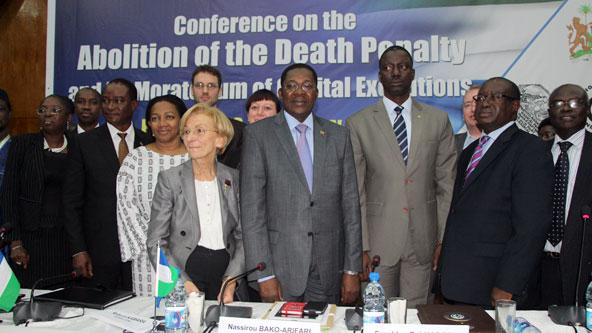
West African governments and civil society discuss death penalty in Freetown
Africa
From the first day, opening speeches by Abdul Rahim Kamara, director of the NGO Manifesto 99, and Hands Off Cain Treasurer Elisabetta Zamparutti conveyed a message of tolerance and non-violence as an alternative to the retributive and violent logic inherent in the death penalty.
Charles Caulker, chairman of Sierra Leone’s National Council of Paramount Chiefs, said that “the pre-colonial African traditions do not provide for the death penalty”, which “expresses pessimism about the human being”. Yet people can change, as Benin President Thomas Boni Yayi said in his message to the conference.
In her statement, Italian Foreign Affairs Minister Emma Bonino said that we must strengthen the UN resolution for a moratorium on executions at the 2014 General Assembly and “break free from the colonial legacy of the death penalty”.
The ministers of foreign affairs and justice of Sierra Leone, Samura Kamara and Frank Kargbo conveyed the salutations of President Ernest Bai Koroma and reiterated their commitment to abolition, starting with the current constitutional review process.
British MP Mark Pritchard (Parliamentarians for Global Action) told the conference of his proposal for “a global parliamentary platform against the death penalty”.
The session “The death penalty and the rule of law” was coordinated by Italian Senator Marco Perduca, vice president of the Radical Party and member of the board of Hands Off Cain.
Successes and setbacks
It featured Benin’s Foreign Affairs Minister Nassirou Bako Arifari, Nigerien historic abolitionist and Justice Minister Marou Amadou, Rwandan Deputy Justice Minister Pascal Bizima Rugnanintwali, and representatives of the ministries of justice of Mali and Togo, who shared their experiences of success or setbacks in a common path towards abolition of the death penalty.
In the session “The death penalty and public opinion”, the World Coalition’s director Maria Donatelli joined parliamentarians and NGO representatives from Liberia, Burkina Faso, Niger, Mali, Guinea and Ghana.
Two other sessions chaired Sierra Leone’s ambassador to the UN, Alieu Kanu, and American law professor Speedy Rice, discussed the local constitutional review process and the prospects for adopting the Draft Additional Protocol to the African Charter on Human and Peoples’ Rights regarding the abolition of the Death Penalty.
After two days of intense work, the Freetown conference adopted a Final Declaration in which delegates and participants asked all African States to finalise the Additional Protocol.
The participants also called on the States to bring domestic legislation in line with the principles of this new Additional Protocol, and to foster principles of restorative justice that take into account the experience of victims and pursue peaceful national reconciliations.
They further urged the States to co-sponsor and support the resolution calling for a worldwide moratorium on executions at the 2014 UN General Assembly, and to convene another continental conference to prepare for that before the UN vote, possibly in Benin.







